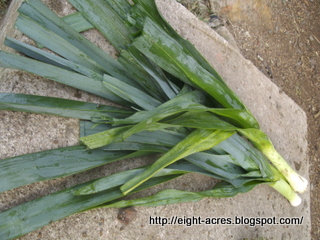I have many confusing conversations with people about green onions, spring onions and shallots. Well, not that many, but when it does come up between myself and another gardener or cook, it is important to first clarify what we are actually talking about, because everyone seems to have a different idea of what these alliums actually are.
This year I planted leeks, and what I call spring onions and
what I thought were shallots. They both
did quite well, especially considering that each bunch of shallots came from
single cloves given to me by a friend and all the spring onion seeds were saved
from the previous year. I’ve grown more
than we can eat right away and I need to make room in the garden, so I am going
to try to keep some of the shallots for storage and dehydrate the rest to make
more onion flakes.
 |
| "shallots", "spring onions" and leeks. They are definitely leeks. |
The confusion is caused by the fact that I never bought any
of these vegetables as seeds with names on the packet, they are from bulbs and
seeds that were given to me, so I don’t really know what I’ve planted!
 |
| definitely leeks |
Its taken a while to figure out what’s going on as different
countries seem to have different names for the same plant. Here’s what I think is going on in my garden:
Further investigation reveals that “shallots” (or scallions,
green onions, spring onions, salad onions, green shallots, onion sticks, long
onions, baby onions, precious onions, yard onions, gibbons, or syboes) can be
any small onion bulbs, whether they are immature or a small variety. However, as mine grow from one clove to form
a cluster, they are most likely Allium ascalonicum,
rather than Allium cepa.
 |
| "shallots" |
The vegetable that I call spring onion seems to a cultivar
of Allium fistulosum,
and as they form no bulb, they are technically scallions going by that link. However, it appears that scallion can also
mean any small onion, as in the definition of shallots above.
 |
| "spring onions" |
I think I’ll just keep calling them what I call them, I just
wanted you to know what I was talking about.
To me, the green stems with no bulb are spring onions and the multiple
cloves are shallots. I haven’t tried
growing any underground onions so far, but I think that will be an experiment
for this winter.
Do you suffer from the same confusion? what do you call them?

LOL I just call them Onions. Saves confusion with the kids...vbg. I also grow leeks but I know what they are as the leaves are a different colour - more grey than green and are sharper on the edges.
ReplyDeleteI am with you on this Liz. I cook a lot of Thai food and the pinky coloured bulbs are shallots and the long skinny green ones are spring onions.
ReplyDeleteWhat's in a name?? Don't forget Welsh Onions, Japanese Bunching Onions, Multiplier Onions, Tree Onions, Egyptian Walking Onions and Potato Onions........
ReplyDeleteYeah, true, I should just call them onions. I know Fiona is a kiwi too and that's why we call them the same thing, so it was cheating to ask really :)
ReplyDeleteLike Judi, I call them Welsh onions, she gave me mine many years ago and they've grown like wildfire ever since. When I gave some to Francis at Green harvest, she said they were Welsh Onions.
ReplyDeletehttp://greenharvest.com.au/SeedOrganic/VegetableSeeds/OkraToOnion.html